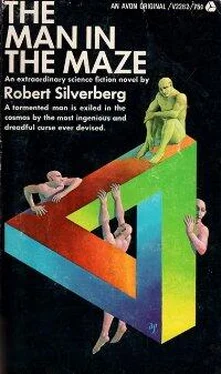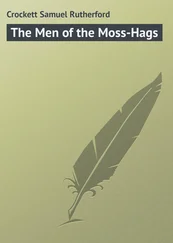They stepped into the hexagonal cell where he kept his diagnostat. Muller sealed the door, and Rawlins sank down limply on the bare floor. His blond hair was pasted by perspiration to his forehead. His eyes were moving jerkily, the pupils dilated.
Muller said, “How long were you under attack?”
“Fifteen, twenty minutes. I don’t know. There must have been fifty or a hundred of them. I kept breaking their backs. A quick crunching sound, you know, like splitting twigs. And then the cage went away.” Rawlins laughed wildly. “That was the best part. I had just finished smashing up all those little bastards and was catching my breath, and then the three big monsters came along, and so naturally the cage vanished and—”
“Easy,” Muller said, “you’re talking so fast I can’t follow everything. Can you get those boots off?”
“What’s left of them.”
“Yes. Get them off and we’ll patch those legs of yours. Lemnos has no shortage of infectious bacteria. And protozoa, and for all I know algae and trypanosomes, and more.”
Rawlins picked at the catches. “Can you help me? I’m afraid that I can’t—”
“You won’t like it if I come any closer,” Muller warned. “To hell with that!”
Muller shrugged. He approached Rawlins and manipulated the broken and bent snaps of the boots. The metal chasing was scarred by tiny teeth; so were the boots themselves, and so were the legs. In a few moments Rawlins was out of his boots and leggings. He lay stretched out on the floor, grimacing and trying to look heroic. His legs were in bad shape, though none of the wounds seemed really serious; it was just that there were so many of them. Muller got the diagnostat going. The lamps glowed and the receptor slot beckoned.
“It’s an old model,” Rawlins said. “I’m not sure what to do.”
“Stick your legs in front of the scanner.”
Rawlins swiveled about. A blue light played on his wounds. In the bowels of the diagnostat things chuttered and clicked. A swab came forth on a jointed arm and ran deftly and lightly up his left leg to a point just above the knee. The machine engulfed the bloody swab and began to digest it back to its component molecules while a second swab emerged to clean Rawlins’ other leg. Rawlins bit his lip. He was getting a coagulant as well as a cleanser so that when the swabs had done their work all blood was gone and the shallow gouges and rips were revealed. It still looked pretty bad, Muller thought, though not as grim as before.
The diagnostat produced an ultrasonic node and injected a golden fluid into Rawlins’ rump. Pain-damper, Muller guessed. A second injection, deep amber, was probably some kind of all-purpose antibiotic to ward off infection. Rawlings grew visibly less tense. Now a variety of arms sprang forward from various sectors of the device, inspecting Rawlins’ lesions in detail and scanning them for necessary repairs. There was a humming sound and three sharp clicks. Then the diagnostat began to seal the wounds, clamping them firmly.
“Lie still,” Muller told him. “You’ll be all right in a couple of minutes.”
“You shouldn’t be doing this,” said Rawlins. “We have our own medical supplies back in camp. You must be running short on necessities. All you had to do was let the drone probe take me back to my camp, and—”
“I don’t want those robots crawling around in here. And the diagnostat has at least a fifty-year supply of usefuls. I don’t get sick often. It can synthesize most of what it’s ever going to need for me. So long as I feed it protoplasm from time to time, it can do the rest.”
“At least let us send you replacements for some of the rare drugs.”
“Not necessary. No charity wanted. Ah! There, it’s done with you. Probably you won’t even have scars.”
The machine released Rawlins, who swung away from it and looked up at Muller. The wildness was gone from the boy’s face now. Muller lounged against the wall, rubbing his shoulderblades against the angle where two faces of the hexagon met, and said, “I didn’t think that you’d be attacked by beasts or I wouldn’t have left you alone so long. You aren’t armed?”
“No.”
“Scavengers don’t bother living things. What made them go after you?”
“The cage did,” Rawlins said. “It began to broadcast the smell of rotting flesh. A lure. Suddenly they were crawling all over me. I thought they’d eat me alive.”
Muller grinned. “Interesting. So the cage is programmed as a trap too. We get some useful information out of your little predicament, then. I can’t tell you how interested I am in those cages. In every part of this weird environment of mine. The aqueduct. The calendar pylons. The streetcleaning apparatus. I’m grateful to you for helping me learn a little.”
“I know someone else who has that attitude,” said Rawlins. “That it doesn’t matter what the risk or cost so long as you collect some useful data out of the experience. Board—”
He cut the word short with a crisp biting gesture.
“Who?”
“Bordoni,” Rawlins said. “Emilio Bordoni, my epistemology professor at college. He gave this marvelous course. Actually it was applied hermeneutics, a course in how to learn.”
“That’s heuristics,” said Muller.
“Are you sure? I have a distinct impression—”
“It’s wrong,” said Muller. “You’re talking to an authority. Hermeneutics is the art of interpretation. Originally Scriptural interpretation but now applying to all communications functions. Your father would have known that. My mission to the Hydrans was an experiment in applied hermeneutics. It wasn’t successful.”
“Heuristics. Hermeneutics.” Rawlins laughed. “Well, anyway, I’m glad to have helped you learn something about the cages. My heuristic good deed. Am I excused from the next round?”
“I suppose,” Muller said. Somehow an odd feeling of good will had come over him. He had almost forgotten how pleasant it was to be able to help another person. Or to enjoy lazy, irrelevant conversation. He said, “Do you drink, Ned?”
“Alcoholic beverages?”
“So I mean.”
“In moderation.”
“This is our local liqueur,” said Muller. “It’s produced by gnomes somewhere in the bowels of the planet.” He produced a delicate flask and two wide-mouthed goblets. Carefully he tipped about twenty centiliters into each goblet. “I get this in Zone C,” he explained, handing Rawlins his drink. “It rises from a fountain. It really ought to be labeled DRINK ME, I guess.”
Gingerly Rawlins tasted it. “Strong!”
“About sixty per cent alcohol, yes. Lord knows what the rest of it is, or how it’s synthesized or why. I simply accept it. I like the way it manages to be both sweet and gingery at the same time. It’s terribly intoxicating, of course. It’s intended as another trap, I suppose. You get happily drunk—and then the maze gets you.” He raised his goblet amiably. “Cheers!”
“Cheers!”
They laughed at the archaic toast and drank.
Careful, Dickie, Muller told himself. You’re getting downright sociable with this boy. Remember where you are. And why. What kind of ogre are you, acting this way?
“May I take some of this back to camp with me?” Rawlins asked.
“I suppose so. Why?”
“There’s a man there who’d appreciate it. He’s a gourmet of sorts. He’s traveling with a liquor console that dispenses a hundred different drinks, I imagine, from about forty different worlds. I can’t even remember the names.”
“Anything from Marduk?” Muller asked. “The Deneb worlds? Rigel?”
“I really can’t be sure. I mean, I enjoy drinking, but I’m no connoisseur.”
“Perhaps this friend of yours would be willing to exchange—” Muller stopped. “No. No. Forget I said that. I’m not getting into any deals.”
Читать дальше












